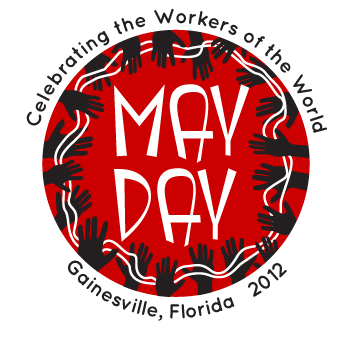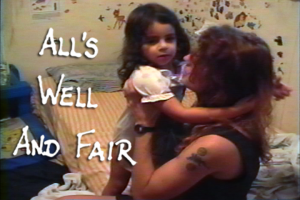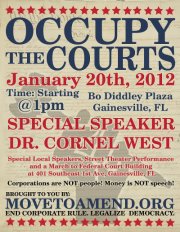BY JOE COURTER
What won me to Occupy from day one in Gainesville was the testimony of one young woman, Sarah Imler, who spontaneously got up on the stage of the Bo Diddley Plaza early on the morning of Oct. 12, the first day of Occupy Gainesville, and started to speak. At the time, there were about 70 people, signs propped up at the front of the stage, pockets of conversation, some media roaming around. There was no sound system, no real plan of action, no real focus. Nobody really knew where this day was going. But Sarah got up, and speaking from her heart, started telling why she was there.
She spoke about the negative effects of U.S. policies and practices on her home, the island territory of Guam. She spoke of enduring hard times with regard to lack of employment, environmental destruction from the impending military expansion, and the local government relying heavily on federal aid. She spoke about her brother, who made the tough decision to join the Air Force for lack of economic opportunity, and her worries that he would be deployed to Afghanistan. She talked about her family there, who are stretched thin by the rising cost of living. She talked about two other relatives who had been in the Middle East as private contractors and an uncle in the Army Reserves who did a tour in Afghanistan. Every day she would think about the dangers they faced and if they would come back alive. She talked about herself and how she could not afford to go to school without accruing massive debt, a precarious situation for a young person already financially strained and facing an uncertain economic future.
This was not a speech; this was not prepared; this was someone who knew why there needs to be an awakening of responsibility of citizens on a mass scale to feel each other’s pain, share our doubts and concerns about the future, understand how this country got into this situation, and begin to hear one another, work together, and see that another way is possible if that awakening could occur. I can’t forget it, and that is why I am writing it now.
It’s been five months since Oct. 12, and her words still resonate in my mind. One person, one of millions of stories that, if we listened and felt, could change how we see our world. We might do something differently as we live our day to day life. Around the world, we see it. Part of it is the technological revolution; the Internet builds solidarity of struggle which had Egyptians ordering pizzas for occupying protestors in Madison, WI. We can see the faces of those resisting corrupt governments and harsh austerity measures. But the non-technical side has the real power, the actual solidarity that comes from joining with others and believing in something larger, becoming more than a “Me,” but a “We.”





